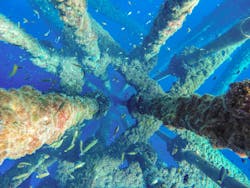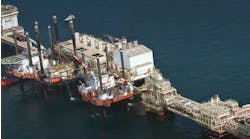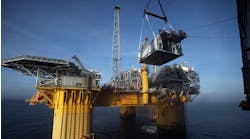UK researchers investigating reuse potential of platform marine growth
Offshore staff
ABERDEEN, UK—CessCon Decom is investigating with researchers at Abertay University in Scotland on how marine growth on decommissioned platform jackets could be recycled and reused.
The feasibility study, which is supported by the Industrial Biotechnology Innovation Centre, could lead to recycling of up to 40,000 tons of marine growth over the next decade.
CessCon already targets recycling of more than 99% of decommissioned materials at its specialist dismantling/treatment sites in the UK.
The marine species found at different water depths on jacket legs are algae, seaweed, mussels, anemones, and hard and soft coral, depending on environmental conditions.
One aim of the investigations is to improve knowledge of what is typically found, including the composition of fatty acids and proteins that could be turned into feed ingredients for other sectors.
Karen Seath, environment and regulatory affairs director at CessCon, said, “We have set an ambitious target to reach the point where 100% of the decommissioned materials brought onshore are reused, reconditioned, refurbished or recycled. At the moment, marine growth is typically sent to landfill or incinerated, but we recognize the opportunity to do more and use this waste to support the supply chains of other sectors.
“There is also ongoing debate as to whether the clean seabed policy is in fact the best way forward, environmentally and financially. In other global markets, for instance, we have seen decommissioned infrastructure converted to artificial reefs and left in the sea, thereby maintaining the underwater ecosystem that is created over the course of the platform’s life.
“At this point in time, however, unless given dispensation, infrastructure in European waters at the end of its life must come out, and we aim to reuse and recycle the material in the most environmentally conscious way.”
Under a previous collaboration between Abertay University and Scottish fishing net manufacturer W&J Knox, waste material collected on nets was turned into livestock feed.
Boon-Seang Chu, lecturer in food science at Abertay University, said, “This study is about understanding the nutritional composition of the marine growth retrieved from decommissioned rigs, whether onshore or offshore, and the feasibility of recovering proteins and fatty acids from the waste materials. The results of this work will help advise follow-on steps of the project.”
11.21.2022




